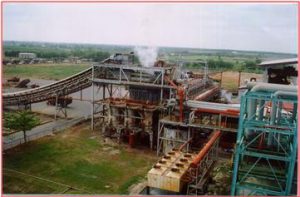The country’s geographical location, climate conditions and agricultural activities give Vietnam in general and its northern plains and midland area in particular a plentiful potential and diversity of renewable energy resources (RE) which are exploitable and useful such as hydropower, biomass, wind energy, solar energy, geothermal energy, biofuel resources and other new energy resources. However, so far effective exploitation and utilization of renewable energies in general and renewable electricity in particular in these areas are still limited in comparison with their potential.

In the context of big shortage in indigenous energy supply and unpredictable situation (coal is anticipated to be imported in after 2015, large hydropower resources will be fully exploited in this decade, accident of Fukushima NPP in Japan recently…), the energy demand – supply and energy prices in Vietnam are affected, therefore, making plan for development and use of renewable energy resources in economic zones of Vietnam is necessary and urgent.
The planned areas are northern plains and midlands in the northern region of Vietnam, including:
– Provinces in plains: Ha Noi, Vinh Phuc, Bac Ninh, Ha Nam, Hung Yen, Hai Duong, Hai Phong, Thai Binh, Nam DInh, and Ninh Binh;
– Provinces in midlands: Dien Bien, Son La, Bac Kan, Tuyen Quang, Yen Bai, Thai Nguyen, Phu Tho, Bac Giang, Hoa Binh, except 06 border provinces which already have renewable energy development plans. Provinces (09 provinces) in northern plains and midlands areas which are covered by this plan have relatively special geographical locations, transport system being upgraded, therefore, it is convenient for connection with other areas in the country and possible development of open economy.
The Ministry of Industry and Trade promulgated the Decision No. 8217/QD-BCT dated 28 December 2012, approving “Renewable Energy Development Plan for Northern Plains and Midlands area for period up to 2020, with vision to 2030” which was prepared by Institute of Energy, with the following contents:
1. Development view points:
– Promote, increase share of exploited and used renewable energy in the context of target of renewable energy development set by the government for period up to 2020, with vision to 2030, including energy production in general and electricity production in particular according to the Government’s Decision No. 1855/QD-TTg dated 27 December 2011 approving the National Power Development Plan for period up to 2020, with vision to 2050.
– Promote exploitation and utilization of potential renewable energy resources of biomass, solar energy resources and energy from waste resources. Exploitation focuses on matured RE technologies, with production cost and support levels suitable to socio-economic conditions in the areas.
– Focus on development of waste treatment projects for production of heat and electricity, contributing in environmental improvement in the planned areas.
– Encourage development of RE projects with aims at electricity saving, supply of electricity to the power grid, population areas, households, supply of heat for production, agro-forestry-fishery processing, for household cooking.
– Priority is given to off-grid power projects integrated in rural electrification course in remote, mountainous areas. Development of renewable energy resources where they are cheaper than diesel electricity or extension of national power grid. Support and strong investment where it is possibility of combining production development and job creation, improving people life condition.
– Encourage development of RE technologies in the direction of product commercialization with participation of all economic sectors within country and overseas under the investment forms specified in the laws.
2. Objectives
2.1. General objectives
Maximally promote exploitation and utilization of renewable energy resources in the areas, step by step increase share of RE in energy/electricity production and consumption, gradually reducing dependence on fossil energy resources, improving energy sector structure, ensuring energy security, environmental protection and sustainable development; achieve target of rural electrification set by the Party and State on supplying electricity to remote, mountainous, island areas.
2.2. Specific objectives
– By 2020, production of renewable energy will be about 889.66 KTOE/year, of which, electricity supply is 1206.63GWh/year and meeting heat demand of 703.48 KTOE/year. Electricity supplied from off-grid RE power sources to about 22,724 households (accounting for about 0.61% of total rural households in planned areas).
– By 2030, production of renewable energy will be about 1838.16 KTOE/year, of which, electricity supply is 5100.81GWh/year, heat supply is 1051.11 KTOE/year.
3. Development orientations
– Speeding up construction and putting into operation of planned small hydropower projects.
– Promote development and support for investment in wind power projects, biomass power projects.
– Priority and investment support are given to local power stations using renewable energy to supply electricity to households in remote, mountainous and island areas in compliance with governmental and local policies on settled agriculture and residence.
– Increasing public awareness on benefits of RE use in order to rapidly develop solar, biogas energy, meeting energy demand for production, business and living.
– Promote and encourage cities, towns in development, investment in collection and use of wastes for electricity generation.
4. Development plan
* Period 2013 – 2020
– Regarding grid connected RE power: total development of 325.7 MW, of which: small hydropower 269.2MW; biogas power 5.5MW; solid waste power 26MW; bagasse power 15MW; rice husk power 10MW.
– Regarding development of RE power for rural electrification course in off-grid remote areas: supply of electricity to 22899 households by available RE power sources at capacity of 7801kWp.
– Regarding development of off grid RE power sources: Self-supply of electricity in medium scale husbandry farms: For period up to 2020: development and application of about 2421000 m3 of biogas plants for electricity generation.
– Regarding RE exploitation for production of heat and biofuels: For period up to 2020: development and application of 521 million m2 of solar water heaters; 6.46 million m3 of biogas plants, 395000 biogas improved cook-stoves; 316000 biomass gasified cook-stoves and ethanol production of 198 million litters/year.
* Orientations for period 2020-2030
– Regarding grid connected RE power: total development of 1230.5 MW, of which: small hydropower 939.8 MW (accounting for 76.4%); biogas power 5.5MW (0.4%); solid waste power 50.5MW (4.1%); biomass power 111MW (9.0%); wind power 110MW (8.9%).
– Regarding off-grid RE power: Self-supply of electricity in medium scale husbandry farms: For period 2020 – 2030: development and application of 436000 m3 of biogas plants for electricity generation.
– Regarding RE exploitation for production of heat and biofuels: development and application of 1158 million m2 of solar water heaters; 7.98 million m3 of biogas plants, 627000 improved biomass cook-stoves; 543000 biomass gasified cook-stoves, ethanol production of 198 million litters/year.
Investment requirements estimated for period up to 2020 is about 16.954.2 billion VND, for period up to 2030 is about 31.577.8 billion VND.
Renewable Energy Development Plan for Northern Plains and Midlands area is important for implementation of national energy strategy, areas socio-economic development plan, contributing in reduction of environmental pollution and ensuring achievement of targets and role of important economic development area of the country.
By Pham Hong Van
Center for Renewable Energy and CDM, Institute of Energy







